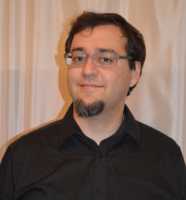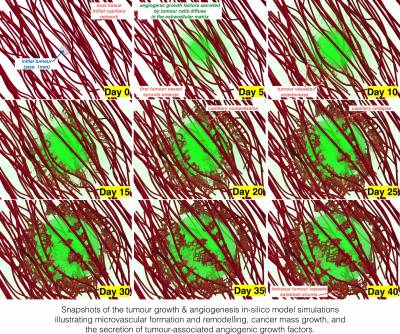01 Feb Simulating Tumour Growth and Angiogenic Response Towards Improving Delivery of Cancer Therapies
MedicalResearch.com Interview with:
Vasileios Vavourakis
Marie Skłodowska-Curie Fellow
Centre for Medical Image Computing
Department of Medical Physics & Biomedical Engineering
Front Engineering Building, Malet Place
University College London
WC1E 6BT, London, UK
MedicalResearch.com: What is the background for this study? What are the main findings?
Response: It is already known that chemical factors play an important role in pathological angiogenesis, the process whereby cancer induces the formation of new blood vessels to provide it with nutrients. However, there is little knowledge about how mechanical forces induced by tumour growth affect the development and functionality of this pathological vasculature. By developing a mathematical & computational model – also referred in the research community as in-silico model – of the physical and chemical interactions occurring during angiogenic cancerous growth, we aimed to provide insights about how mechanical forces influence cancer-induced angiogenesis. The most important finding of our study is that mechanical forces play a key role in solid tumour-induced angiogenesis.
MedicalResearch.com: What should readers take away from your report?
Response: What the reader should take away from our PLOS Computational Biology report is the great potential of in-silico models towards understanding cancer physiology, and exploring new avenues in targeted cancer therapy. More precisely, such models might be used to provide guidelines for the use of existing and emerging strategies to normalize the pathological vasculature, hence, optimise the delivery of therapeutic drugs to cancerous tissue.
MedicalResearch.com: What recommendations do you have for future research as a result of this study?
Response: The next steps of our research are to combine our in-silico modelling platform with experimental investigations, to improve the delivery of anti-cancer drugs and the efficacy of radiotherapy. Our aim is to reduce the dependence on animal studies in developing anti-cancer therapies, and to design more effective human clinical trials.
MedicalResearch.com: Thank you for your contribution to the MedicalResearch.com community.
Citation:
Vasileios Vavourakis ,Peter A. Wijeratne ,Rebecca Shipley ,Marilena Loizidou,Triantafyllos Stylianopoulos ,David J. Hawkes
Published: January 26, 2017
http://dx.doi.org/10.1371/journal.pcbi.1005259
Note: Content is Not intended as medical advice. Please consult your health care provider regarding your specific medical condition and questions.
More Medical Research Interviews on MedicalResearch.com
[wysija_form id=”5″]
Last Updated on February 1, 2017 by Marie Benz MD FAAD


